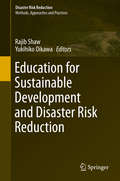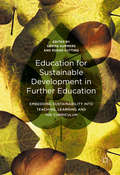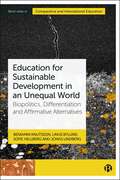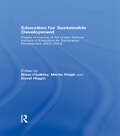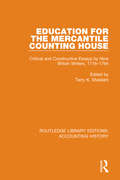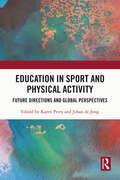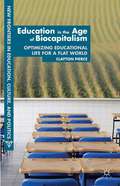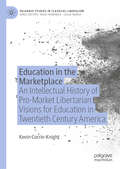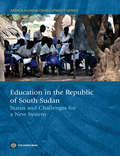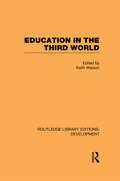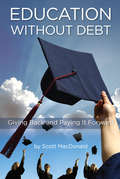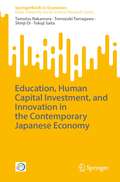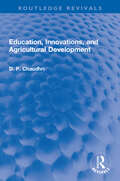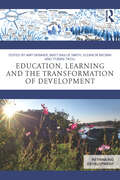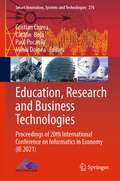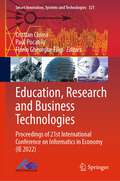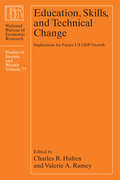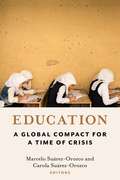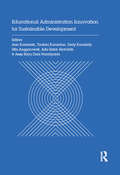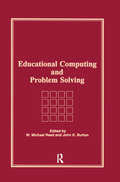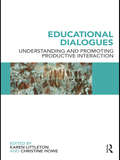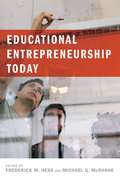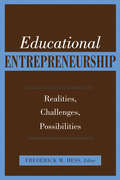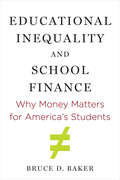- Table View
- List View
Education for Sustainable Development and Disaster Risk Reduction
by Rajib Shaw Yukihiko OikawaEducation for Sustainable Development (ESD) and Disaster Risk Reduction Education (DRRE) have overlapping areas of concern focusing on strengthening the link to local communities. In reality, there is significant synergy in ESD and disaster risk reduction (DRR). Both concepts urge looking at the communities, both focus on behavior changes and both call for linking knowledge to action. The Decade of Education for Sustainable Development (DESD) ends in 2014 and the Hyogo Framework for Action (HFA) ends in 2015. Therefore, at this junction, it is important to review the progress made over the past 10 years and to suggest future synergy options. This book is the first attempt to review these two emerging fields and to provide input to the future direction of education. The book has 11 chapters, drawing lessons mainly from Japan and discussing their implications for the world. The first four chapters provide an overview of the ESD-DRR linkage, ESD and its evolution, DRRE and Climate Change Education. These are followed by case studies from ESD practices in Japan, in schools, universities and communities. The primary target groups for this book are students and researchers in the fields of environment, disaster risk reduction and climate change studies. The book provides them with a good idea of the current research trends in the field and furnishes basic knowledge about these vital topics. Another target group comprises practitioners and policy makers, who will be able to apply the knowledge collected here to establishing policy and making decisions.
Education for Sustainable Development in Further Education
by Denise Summers Roger CuttingThisbook will enable teachers and managers in the post-compulsory sector to considera range of approaches to embed Education for Sustainable Development (ESD) intheir practice in the post-compulsory sector. There will be the opportunity to consider key debates, useful links andsuggested reading to encourage further investigation and development ofpractice. Fundamentally, this book aimsto empower teachers to critically analyse ESD through their own subjectspecialisms, engage in the debate and learn with their students. Democratic and participative approachesintroduced will help readers to question traditional transmissive styles ofteaching and learning and move on to the radical and transformative approachesrequired to embrace ESD. Therefore this book, whilst including illustrativeexamples, will encourage the reader to look at their own subject specialisms,practice, interests and those of their students to co-construct a curriculum thatembeds ESD.
Education for Sustainable Development in an Unequal World: Biopolitics, Differentiation and Affirmative Alternatives (Bristol Studies in Comparative and International Education)
by Sofie Hellberg Jonas Lindberg Beniamin Knutsson Linus BylundEducation for Sustainable Development (ESD) is recurrently depicted as an enterprise that unites humanity in a common pursuit of a more just and sustainable world. But how is this enterprise pursued on a planet that is enormously unequal? Drawing on biopolitical theory and rich empirical data from different contexts around the world, this book explores how ESD is unpacked depending on whether people are rich or poor. The book demonstrates how ESD is adapted to the lifestyles and living conditions of different populations. The implication of this depoliticized sensitivity to local ‘realities’, the book argues, is that inequality becomes accommodated and that different responsibilities are assigned to rich and poor. Ultimately, the book considers alternatives to this biopolitical divide.
Education for Sustainable Development: Papers In Honour Of The United Nations Decade Of Education For Sustainable Development (2005-2014)
by David Higgitt Martin Haigh Brian ChalkleyIn 2005, The United Nations launched its Decade of Education for Sustainable Development, which recognises that education, including Higher Education is the key to the change in social attitudes that will be needed to protect the welfare of future generations. This involves helping learners to live as though the future matters and to achieve ecoliteracy. This includes the understanding that personal lifestyle decisions may have consequences, ranging from climate change, through loss of biodiversity, to pollution and resource depletion that may permit environmental degradation on a planetary scale. It also involves helping them to develop the skills needed to cope with such challenges. This international collection of research papers and position statements from special issues of the Journal of Geography in Higher Education and Applied Environmental Education and Communication, written by many of the leading practitioners in the field, aims to provide resources and practical guidance for all seeking to promote and engage in education for a sustainable future. Rabindranath Tagore encouraged each learner to make their actions demonstrate a harmonious union between education and environment. David Orr argued that the world needs people who live well in their places to make the world both habitable and humane and that the main challenge for education is to help learners make their minds fit for life on Earth. This book tries to chart a practical route towards these objectives. This book was previously published as special issues of the Journal of Geography in Higher Education and Applied Environmental Education and Communication
Education for the Mercantile Counting House: Critical and Constructive Essays by Nine British Writers, 1716-1794 (Routledge Library Editions: Accounting History #17)
by Terry K. SheldahlThis book, first published in 1989, surveys higher education in preparation for business careers, particularly the fledgling profession of accounting. Examining the origins of English schooling for merchants, it brings to light articles and writers from the eighteenth century who proposed a liberal education for business – a key part of the development of the history of accounting.
Education in Sport and Physical Activity: Future Directions and Global Perspectives
by Karen PetrySport and physical activity are embedded in our education systems and in wider society. This book takes the broadest possible look at this topic, across every key discipline and on different continents, opening up important new directions for the future development of sport and physical activity education. The book examines education in sport coaching, sport management, PE teacher training, physical activity and health promotion, and the emerging discipline of outdoor studies, considering how trends such as globalisation, digitalisation, and privatisation are having a profound impact on education programs. It identifies some of the most important societal issues that must be addressed by sport and physical activity educators, including healthy lifestyles, inequality, intercultural aspects, human rights, and emerging technologies, and looks at how sport and physical activity education in Europe, North America, Latin America, Asia, and Australasia is evolving to meet these challenges. Designed to invite self-reflection, to provoke debate and to open up new cross-disciplinary and international perspectives within sports organisations and higher education institutions, this book is fascinating reading for advanced students, researchers, teachers, and policy makers with an interest in sport and physical activity.
Education in the Age of Biocapitalism
by Clayton Pierce"This book is an in-depth examination of the growing alignment between powerful global bioindustries and education reform in the U. S. Utilizing a biopolitical methodology, the book focuses on how value-added measures and other neoliberal strategies embedded in policies such as 'race to the top' are involving schools in a project to manage and regulate educational life for competing in a new 'flat world'. Understanding the educational present, this work argues, requires individuals to consider what advanced industrialized nations across the globe are viewing as the future. Biocapitalist development in areas such as genetic engineering, drug therapies, and cellular cloning is the promissory future driving nations like the U. S. to out-compete and out-educate one another at any cost. This book assesses the implications for education in the biocapitalist era and points to alternative futures not based on such a vision of life and its productive potential"--
Education in the Marketplace: An Intellectual History of Pro-Market Libertarian Visions for Education in Twentieth Century America (Palgrave Studies in Classical Liberalism)
by Kevin Currie-KnightThis book offers an intellectual history of the libertarian case for markets in education. Currie-Knight tracks the diverse and evolving arguments libertarians have made, with each chapter devoted to a different libertarian thinker, their reasoning and their impact. What are the issues libertarians have had with state-controlled public schooling? What have been the libertarian voices on the benefits of markets in education? How have these thinkers interacted with law and policy? All of these questions are considered in this important text for those interested in debates over market mechanisms in education and those who are keen to understand how those arguments have changed over time.
Education in the Republic of South Sudan
by World Bank StaffAs part of the Country Status Report series, this book provides a comprehensive review of the status of education in post-conflict South Sudan. It is a result of collaborative work between MOE, key education stakeholders in South Sudan, and the World Bank. The aim is to contribute to the development of a shared vision for the future of the education system between government, citizens, and partners of the new South Sudan. With the signing of the Comprehensive Peace Agreement in 2005 began the establishment of a new education system specifically for South Sudan. Primary school enrollments approximately doubled between 2005 and 2009 from 0. 7 million to 1. 4 million; yet, the recent rapid growth has resulted in a concentration of students in the early grades, a high proportion of overage students, repetition, dropout, and weak levels of student learning. Thanks to the detail it offers, this book provides a solid foundation for dialogue about the future of education in South Sudan and will immediately be used to inform the preparation of an Education Sector Plan for the new country. The book underlines the strong progress that South Sudan has made in terms of expanding access to education, but also the many challenges that lie ahead. In particular, it sheds light on such questions as: Is everyone getting a chance at education? How much are students learning? What is the situation of schools and service delivery? What is South Sudan investing in education and how is it using these resources? Are the resources well-deployed and managed to ensure efficient functioning of the education system? The book offers a valuable and comprehensive resource for anyone interested in education in South Sudan.
Education in the Third World (Routledge Library Editions: Development)
by Keith WatsonThis reissue examines the crucial question of how the education systems of Third World countries continue to be influenced by the former colonial powers, arguing that decisions and views made early in the twentieth century cannot always be so readily condemned from the standpoint of the 1980s. The study begins by placing the problem in its historical context and goes on to examine different regions of the Third World influenced by colonialism. It concludes with a contemporary global overview of current colonial dependency and provides a detailed and comprehensive bibliography on different facets of education and colonialism.
Education without Debt: Giving Back and Paying It Forward
by Scott MacDonaldAlmost 50 million Americans have cumulatively borrowed more than $1.5 trillion to attend college. Roughly one-third of all adults aged 25 to 34 have a student loan. In Education without Debt businessman and philanthropist Scott MacDonald examines the real-life impact of crushing levels of student debt on borrowers and what can be done to fix this crisis. Weaving together stories of debt-impaired lives with stories of personal success achieved with the essential help of financial aid, MacDonald reveals the devastating personal and societal impact of the debt problem and offers possible solutions. He explores the efforts of colleges and private philanthropists to make education affordable and relates his own experience of funding financial aid for need-eligible students at five universities. Education without Debt is a must-read book for anyone concerned about the rising cost of education and what to do about this critical policy and societal issue.
Education, Human Capital Investment, and Innovation in the Contemporary Japanese Economy (SpringerBriefs in Economics)
by Tamotsu Nakamura Tomoyuki Tamagawa Shinji Oi Tokuji SaitaThis book analyzes education in Japan from the viewpoint of “the stagnant current Japanese economy”. Tomoyuki Tamagawa, a long-time mathematics teacher in junior high school, is now a vice principal. He and Tamotsu Nakamura have written Chapter 1 of this book together because they believe that the loss of vitality in the Japanese economy is due to the problem of human capital formation in school education. Shinji Oi has worked for many years at a Japanese broadcasting station and has extensive experience in human resource development. In Chapter 2, he analyzes the relationship between optimal human capital investment and labor market mobility, based on his recognition of the importance of vocational training, or human capital investment at the firm and the necessity for good allocation of human resources. Tokuji Saita is well versed not only in the realities and practices in the financial industry but also in the financial system as a whole. In Chapter 3, based on his long experience in the financial industry, he analyzes and points out the importance of “openness” of innovation from a macroeconomic point of view.
Education, Innovations, and Agricultural Development: A Study of North India (1961-72) (Routledge Revivals)
by D. P. ChaudhriFirst published in 1979, Education, Innovations, and Agricultural Development investigates the effect of education on agricultural productivity and innovations that took place in the wake of the Green Revolution in North India, using a simultaneous equations model. The Green Revolution of the 1960s, with its twin aims of raising production and improving the quality of input, was expected to induce a majority of farming families to respond to policies and programmes devised for bringing about development in agricultural sectors. Focusing on the wheat-growing areas of Punjab and Haryana, where high yielding varieties of seed have been introduced extensively, it shows that general education up to secondary level has a significant impact on the diffusion of technology and agricultural productivity and that higher production in turn increases the demand for education. This book deserves to be read by all concerned with development in Asian countries; agriculture; developmental economics; and educationists.
Education, Learning and the Transformation of Development (Rethinking Development)
by Amy Skinner, Matt Baillie Smith, Eleanor Brown and Tobias TrollWhilst education has been widely recognised as a key tool for development, this has tended to be limited to the incremental changes that education can bring about within a given development paradigm, as opposed to its role in challenging dominant conceptions and practices of development and creating alternatives. Through a collection of insightful and provocative chapters, this book will examine the role of learning in shaping new discourses and practices of development. By drawing on contributions from activists, researchers, education and development practitioners from around the world, this book situates learning within the wider political and cultural economies of development. It critically explores if and how learning can shape processes of societal transformation, and consequently a new language and practice of development. This includes offering critical accounts of popular, informal and non-formal learning processes, as well as the contribution of indigenous knowledges, in providing spaces for the co-production of knowledge, thinking and action on development, and in terms of shaping the ways in which citizens engage with and create new understandings of ‘development’ itself. This book makes an important and original contribution by reframing educational practices and processes in relation to broader global struggles for justice, voice and development in a rapidly changing development landscape.
Education, Research and Business Technologies: Proceedings of 20th International Conference on Informatics in Economy (IE 2021) (Smart Innovation, Systems and Technologies #276)
by Cristian Ciurea Paul Pocatilu Cătălin Boja Mihai DoineaThis book includes high-quality research papers presented at 20th International Conference on Informatics in Economy (IE 2021), which is held in Bucharest, Romania during May 2021. The book covers research results in business informatics and related computer science topics, such as IoT, mobile-embedded and multimedia solutions, e-society, enterprise and business solutions, databases and big data, artificial intelligence, data-mining and machine learning, quantitative economics.
Education, Research and Business Technologies: Proceedings of 21st International Conference on Informatics in Economy (IE 2022) (Smart Innovation, Systems and Technologies #321)
by Florin Gheorghe Filip Cristian Ciurea Paul PocatiluThis book includes high-quality research papers presented at 21st International Conference on Informatics in Economy (IE 2022), which is held in Bucharest, Romania, during May 2022. This book covers research results in business informatics and related computer science topics, such as IoT, mobile-embedded and multimedia solutions, e-society, enterprise and business solutions, databases and big data, artificial intelligence, data mining and machine learning, quantitative economics.
Education, Skills, and Technical Change: Implications for Future US GDP Growth (National Bureau of Economic Research Studies in Income and Wealth)
by Charles R. Hulten Valerie A. RameyOver the past few decades, US business and industry have been transformed by the advances and redundancies produced by the knowledge economy. The workplace has changed, and much of the work differs from that performed by previous generations. Can human capital accumulation in the United States keep pace with the evolving demands placed on it, and how can the workforce of tomorrow acquire the skills and competencies that are most in demand? Education, Skills, and Technical Change explores various facets of these questions and provides an overview of educational attainment in the United States and the channels through which labor force skills and education affect GDP growth. Contributors to this volume focus on a range of educational and training institutions and bring new data to bear on how we understand the role of college and vocational education and the size and nature of the skills gap. This work links a range of research areas—such as growth accounting, skill development, higher education, and immigration—and also examines how well students are being prepared for the current and future world of work.
Education: A Global Compact for a Time of Crisis
by Suárez-Orozco, Marcelo; Suárez-Orozco, CarolaIn an age of catastrophes—unchecked climate change, extreme poverty, forced migrations, war, and terror, all compounded by the COVID-19 pandemic—how can schooling be reengineered and education reimagined? This book calls for a new global approach to education that responds to these overlapping crises in order to enrich and enhance the lives of children everywhere.Marcelo Suárez-Orozco and Carola Suárez-Orozco convene scholars and practitioners from a range of disciplines—including anthropology, neuroscience, demography, psychology, child development, sociology, and economics—who offer incisive essays on the global state of education. Contributors consider how educational policy and practice can foster social inclusion and improve outcomes for all children. They emphasize the centrality of education to social and environmental justice, as well as the philosophical foundations of education and its centrality to human flourishing, personal dignity, and sustainable development. Chapters examine topics such as the neuroscience of education; the uses of technology to engage children who are not reached by traditional schooling; education for climate change; the education of immigrants, refugees, and the forcibly displaced; and how to address and mitigate the effects of inequality and xenophobia in the classroom. Global and interdisciplinary, Education speaks directly to urgent contemporary challenges.Contributors include Stefania Giannini, the director of education for UNESCO; development economist Jeffrey Sachs; cognitive psychologist Howard Gardner; Carla Rinaldi, president of the Reggio Children Foundation; and academics from leading global universities. The book features a foreword by Pope Francis.
Educational Administration Innovation for Sustainable Development: Proceedings of the International Conference on Research of Educational Administration and Management (ICREAM 2017), October 17, 2017, Bandung, Indonesia
by Aan Komariah Taufani C. Kurniatun Dedy A. Kurniady Rita Anggorowati Ade Gafar Abdullah Asep Bayu Dani NandiyantoThe International Conference on Research of Educational Administration and Management (ICREAM) held on October 17, 2017 in Bandung, West Java, Indonesia. The aim of ICREAM is to provide a platform for educators, administrators, managers, leaders, policy makers, researchers, scholars, principals, supervisors, graduate students, practitioners, academicians, professionals and teachers from different discipline backgrounds to present and discuss research, developments and innovations in the fields of educational administration. It provides opportunities for the delegates to exchange new ideas and application experiences, to establish business or research relations and to find global partners for future collaboration.
Educational Computing and Problem Solving
by W Michael Reed John K BurtonFirst published in 1988. Professionals who are on the cutting edge of educational computing discuss, in this provocative new book, one of the most exciting prospects of the field--harnessing the power of the computer to enhance the development of problem-solving abilities. Here is everything that educators will need to know to use computers to improve higher level skills such as problem solving and critical thinking. Current aspects of problem-solving theory, a philosophical case for including programming languages in the curriculum, state-of-the-art research on computers and problem solving, and a look at problem-solving software are included in this comprehensive volume. The research and its application to instruction are grounded in problem-solving theory--making this book a unique and critical addition to the existing literature.
Educational Dialogues: Understanding and Promoting Productive interaction
by Karen Littleton Christine HoweEducational Dialogues provides a clear, accessible and well-illustrated case for the importance of dialogue and its significance for learning and teaching. The contributors characterise the nature of productive dialogues, to specify the conditions and pedagogic contexts within which such dialogues can most effectively be resourced and promoted. Drawing upon a broad range of theoretical perspectives, this collection examines: theoretical frameworks for understanding teaching and learning dialogues teacher-student and student-student interaction in the curricular contexts of mathematics, literacy, science, ICT and philosophy the social contexts supporting productive dialogues implications for pedagogic design and classroom practice. Bringing together contributions from a wide range of internationally renowned researchers, this book will form essential reading for all those concerned with the use of dialogue in educational contexts.
Educational Entrepreneurship Today (Educational Innovations Series)
by Frederick M. Hess Michael Q. McShaneIn this book, Frederick M. Hess and Michael Q. McShane assemble a diverse lineup of high-profile contributors to examine the contexts in which new initiatives in education are taking shape. They inquire into the impact of entrepreneurship on the larger field―including the development and deployment of new technologies―and analyze the incentives, barriers, opportunities, and tensions that support or constrain innovation. The book offers critical perspectives on the impact of entrepreneurship and also includes lessons from leading entrepreneurs, in which they use case studies drawn from their own experience to illustrate the realities of leading disruptive change in education and pose guiding questions for the next generation of innovators. In a time of increasing polarization around education policy, this timely, frank, and insightful volume shows how we can begin to create systems in which entrepreneurial ideas and fresh thinking are welcomed, constructively employed, and held accountable for the public good.
Educational Entrepreneurship: Realities, Challenges, Possibilities
by Frederick M. HessThis lively and provocative book introduces this burgeoning field for readers concerned with K-12 education in the United States--and with efforts to reform and improve it. Entrepreneurship has emerged in recent years as an unprecedented and influential force in U.S. K-12 education. Yet the topic has received surprisingly little serious or systematic attention. Educational Entrepreneurship aims to fill this gap. This timely volume addresses a number of central questions: What is educational entrepreneurship and what does it look like? Who are the educational entrepreneurs and what motivates them? What tools do entrepreneurs need to be successful? What policies or practices enable or impede entrepreneurship? What would it mean to open up the education sector to more entrepreneurial activity? An interesting and admirable range of contributors offers clusters of articles on the nature of educational entrepreneurship; the political, policy, and legal contexts that face educational entrepreneurs; various models of entrepreneurial activity; the role of for-profit organizations in K-12 education; and possible future directions for educational entrepreneurs.
Educational Inequality and School Finance: Why Money Matters for America's Students
by Bruce D. BakerIn Educational Inequality and School Finance, Bruce D. Baker offers a comprehensive examination of how US public schools receive and spend money. Drawing on extensive longitudinal data and numerous studies of states and districts, he provides a vivid and dismaying portrait of the stagnation of state investment in public education and the continuing challenges of achieving equity and adequacy in school funding. Baker explores school finance, the school and classroom resources derived from school funding, and how and why those resources matter. He provides a critical examination of popular assumptions that undergird the policy discourse around school funding—notably, that money doesn&’t matter and that we are spending more and getting less—and shows how these misunderstandings contribute to our reluctance to increase investment in education at a time when the demands on our educational system are rising. Through an introduction to the concepts of adequacy, equity, productivity, and efficiency, Baker shows how these can be used to evaluate policy reforms. He argues that we know a great deal about the role and importance of money in schools, the mechanisms through which money matters for student outcomes, and the trade-offs involved, and he presents a framework for designing and financing an equitable and adequate public education system, with balanced and stable sources of revenue. Educational Inequality and School Finance takes an issue all too often relegated to technical experts and makes it accessible for broader public empowerment and engagement.
